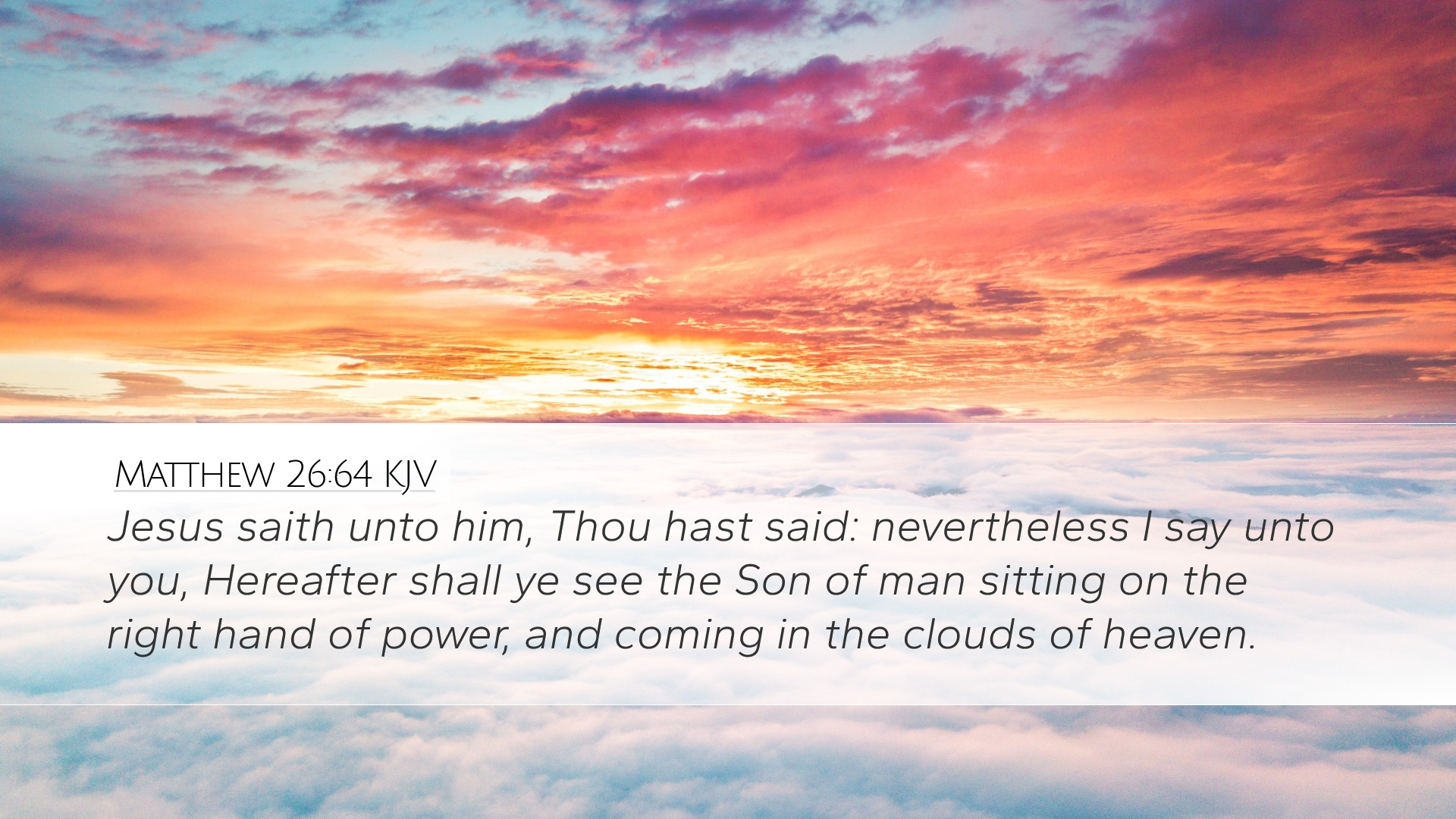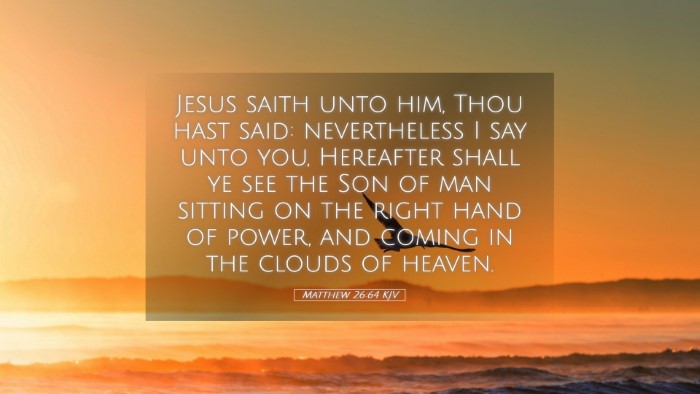Commentary on Matthew 26:64
Matthew 26:64 states: "Jesus said to him, 'You have said it yourself; nevertheless I tell you, hereafter you will see the Son of Man sitting at the right hand of Power, and coming on the clouds of heaven.'" This profound declaration from Jesus to the High Priest during His trial encompasses significant theological implications and prophetic fulfillment. Below is a synthesis of insights from the public domain commentaries of Matthew Henry, Albert Barnes, and Adam Clarke.
Contextual Analysis
This verse occurs within the context of Jesus' trial before the Sanhedrin, where He faces accusations primarily concerning His identity and claims. The High Priest, Caiaphas, directly questions Jesus about His divinity, leading to this pivotal moment of assertion about His identity as the Messiah.
Matthew Henry's Commentary
Exaltation and Authority: Matthew Henry emphasizes that Jesus affirms His role as the rightful Messiah and Son of Man. The phrase "You have said it" acknowledges the truth in Caiaphas's statement, thus affirming Jesus' identity while simultaneously highlighting the irony that the religious leaders fail to recognize Him. Henry underscores the significance of "sitting at the right hand of Power," suggesting this position indicates ultimate authority and dominion over all creation.
Prophetic Fulfillment: Henry notes that this statement also embodies prophetic fulfillment. The reference to "coming on the clouds of heaven" alludes to Old Testament prophecies, notably from Daniel 7:13-14, asserting that Jesus will return in glory to claim His kingdom—a reminder of His dual role as both the suffering servant and the conquering King.
Albert Barnes' Commentary
Clarity of Statement: Albert Barnes elucidates that Jesus' response clarifies any ambiguity regarding His identity. The declaration not only confirms His Messiahship but also serves as a proclamation of His future vindication. Barnes points out the gravity of the moment; Jesus stands before His accusers yet asserts His invincible sovereignty—a powerful declaration for believers regarding His ultimate authority over life and death.
Judgment and Hope: Barnes also highlights the dual aspect of this verse—judgment for those who oppose Christ and hope for His followers. The phrase "coming on the clouds of heaven" serves as a reminder of His second coming, where He will judge the living and the dead, establishing justice and righteousness for His people.
Adam Clarke's Commentary
Divine Authority: Adam Clarke posits that the phrase "sitting at the right hand" suggests divine approval and authority bestowed upon Jesus by God the Father. This presents a profound theological truth about the relationship within the Trinity. Clarke emphasizes that this does not merely represent a position of honor but signifies active participation in divine rule and intercession on behalf of believers.
The Eschatological Vision: Clarke further delves into the eschatological implications present in this verse. The imagery of clouds is often associated with divine revelation and judgment. By declaring this to Caiaphas, Jesus not only indicates His return but also foreshadows the judgment upon those who reject Him. Clarke elucidates that this statement serves both as a warning and hope—a foundational truth for theological reflection.
Theological Implications
The insights derived from these commentators yield profound theological discourse on several points:
- Identity of Christ: This verse encapsulates the fundamental Christian assertion of Jesus as the Messiah. The affirmation from Christ itself is crucial for pastoral teaching and congregational understanding.
- Authority and Kingship: The assertion "sitting at the right hand" calls for reflection on the sovereignty of Christ over all matters, relevant for students of theology who engage with Christology.
- Prophecy and Fulfillment: Understanding Jesus as fulfilling Old Testament prophecy enriches biblical scholarship and encourages deeper study into Scripture.
- Eschatological Theme: The second coming of Christ is a key eschatological theme that pastors can expound upon, offering both warning and hope to congregants.
Conclusion
Matthew 26:64 is a profound declaration of Jesus’ identity and future exaltation amidst trial and judgment. The harmony among the commentaries by Matthew Henry, Albert Barnes, and Adam Clarke illustrates the multifaceted truth of Christ’s reign and the hope we possess as believers. Such insight is crucial for pastors, students, and scholars as they navigate the depths of Scripture and its implications for faith and practice.


